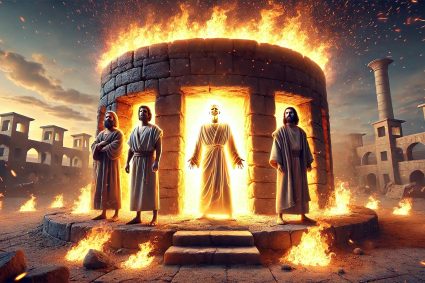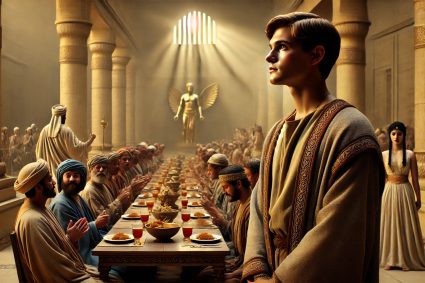
📆 July 18, 2025
🌟 Do Not Retaliate!
🧭 Why Forgiveness Transforms More Than Revenge
──────────────── 🔦 ────────────────
📜 Bible Verse
“Do not repay evil with evil or insult with insult. On the contrary, repay with a blessing, because to this you were called so that you may inherit a blessing.”
– 1 Peter 3:9
──────────────── 🔦 ────────────────
🔑 Introduction
Sometimes, a single sentence, a look, or an action is enough – and something inside us breaks. It could be an argument between friends, bullying at school, or a hurtful comment on social media. In those moments, we feel the strong desire to strike back. Revenge might seem justified at first.
But what if there is another way?
A way that doesn’t rely on “an eye for an eye,” but on something stronger than retaliation: forgiveness, compassion, love.
Not because it’s easy – but because it sets us free.
Today, we want to explore how to let go of pain without denying it – and how to find peace where others would choose war.
──────────────── 🔦 ────────────────
🎯 Devotional
Forgiveness is not a natural human reaction – it is a divine choice.
Those who forgive do not choose the easy path. Those who forgive choose peace over payback.
Ellen White writes in “The Better Way”:
“God wants us to pass on His love – even to those who hate us. This is not a natural response, but the result of His grace working within us.”
Jesus teaches us in the Sermon on the Mount:
“Love your enemies, bless those who curse you, do good to those who hate you…”
– Matthew 5:44
This doesn’t mean we must silently endure everything or avoid setting boundaries.
But it does mean we respond not with hatred – but with a heart posture that makes transformation possible.
──────────────── 🔦 ────────────────
📝 Story – The Story of Samuel and the Thief
Samuel was 17 and worked at a small bike shop in a big city. He had been saving up for months to buy his own mountain bike. Every day after school, he cleaned rims, tightened chains, helped customers – all to reach his goal.
Finally, the day came. He had enough money. The shop owner gave him an employee discount, and Samuel proudly bought the bike he had dreamed of for so long.
But just three days later, it was gone. Stolen. Right outside his school.
Later, it turned out that a classmate had stolen it and sold it at a flea market.
Samuel was devastated. And angry. He knew exactly who it was. He could have reported him. Everyone in the class would’ve sided with him.
But Samuel did something completely unexpected.
He went up to the boy. Calmly. Directly. And said:
“I know what you did. I’m really disappointed. But I’m not going to report you. I just want to tell you: I forgive you. Not because I have to. But because I don’t want to become like you.”
The thief was speechless. The whole class was talking about it for days.
Many didn’t understand why Samuel was “so dumb” not to go to the police.
But a few weeks later, the boy came back to Samuel – with an envelope. Inside were 100 euros.
“I can’t give you your bike back,” he said, “but I want to make it right.”
They never became friends.
But from that day on, they treated each other with respect.
And Samuel?
A regular customer from the shop gave him a used mountain bike – better than the old one.
──────────────── 🔦 ────────────────
💭 What can we learn from this story?
Samuel had every right to seek revenge.
He was betrayed, robbed, and his hard work trampled on.
But he made a conscious choice not to retaliate – and opened a door that revenge could never unlock: the door to transformation.
This story teaches us three key truths:
-
Forgiveness changes hearts.
Not only the offender’s, but also our own. Samuel didn’t stay trapped in pain – he let go. And the other boy was deeply moved by his choice. -
God’s ways are often surprising.
Samuel didn’t get his stolen bike back – he received something much greater: respect, restoration, and unexpected blessing. -
You don’t have to approve of what happened to forgive.
Forgiveness doesn’t mean saying the wrongdoing was okay. It means choosing not to respond with hate – but with strength and dignity.
Forgoing revenge is not weakness. It’s a sign that we’re willing to act in God’s strength, not our own.
And that’s what makes us a light in this world.
──────────────── 🔦 ────────────────
🧠 Reflection – What does this mean for you?
What would you have done in Samuel’s place?
Is there someone who has “stolen” something from you – trust, honor, friendship?
Are you ready to let go rather than strike back?
Forgiveness doesn’t mean you approve of what happened.
But it means you’re no longer a prisoner of the pain.
You choose freedom – and let God take over.
──────────────── 🔦 ────────────────
💡 Today’s Reflections
-
Write down the name of someone you feel like “getting back at.”
-
Ask God to help you release that person.
-
Do one small, kind act today – as a sign that you’re choosing peace.
──────────────── 🔦 ────────────────
🙏 Prayer
Lord Jesus,
You know my heart and where I’ve been hurt.
You know how hard it is for me to let go.
But I don’t want to become bitter.
Help me not to repay evil for evil – but to forgive.
Show me what it means to share Your love, even in difficult moments.
Make my heart free. Amen.
──────────────── 🔦 ────────────────
🧃 Takeaway Thought for Today
“Forgiveness doesn’t set the other person free – it sets you free.”






